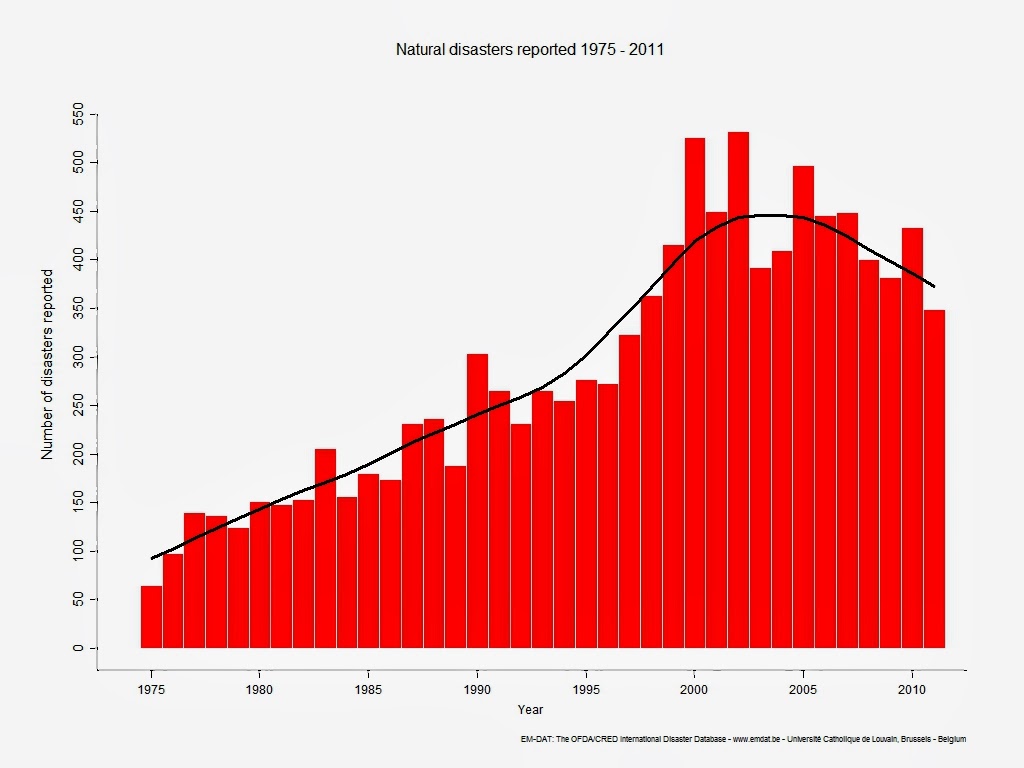Al Gore, former Vice President of the United States, is a big advocate of decreasing climate change. In his 2006 film, An Inconvenient Truth, (takepart 2014) Gore discusses a range of topics surrounding climate change, including how the changing atmosphere is affecting our everyday weather. Gore’s main point is this: climate change is what is causing the extreme weather conditions and disasters that have been occurring in the past 20 years (International Disaster Database 2014). His theory is not far fetched. According to these graphs from NASA and the International Disaster Database, the rising CO2 levels correspond with the rising number of natural disasters in the United States.
 |
(Climate Change: How do we know? 2014) |
 |
(Natural Disaster Trends 2011) |
This is proof that rising CO2 levels affect more than just rising earth temperatures. The occurrence of more natural disasters is an issue for an obvious reasons; they kill humans and animals and ruin landscapes where the disaster strikes. Though Gore’s film had some incorrect facts, his idea that “extreme weather events...are now a hundred times more common than 30 years ago” (Mashable 2014) is a very accurate theory.
 |
| (Getty 2007) |
With Gore’s opinions on climate change as back up, it is easy to see how people are so concerned about polar bears. CO2 is "warming the earth's blanket", as more gas collects in our atmosphere (EPA 2013). Ice melts when the weather gets warm, which is why polar bears are facing adversity; they are slowly losing their habitat. While polar bears are not usually the direct subjects of natural disasters, their food sources may be. This shows again how natural disasters and warm temperatures, all caused by rising CO2 levels, are hurting the polar bears. Gore and other animal activists argue that polar bears are more important than our need for and use of greenhouse gasses. Anything one could do to lower their emission of CO2 could help save the polar bears, and could overall improve the earth's condition.
On the other hand of the spectrum, political radio personality Rush Limbaugh does not believe in man made climate change. He says, “If you believe in God…you cannot believe in man made global warming.” (Visser 2013). This sparked controversy, clearly for its religious input, but also for the fact that Limbaugh is almost saying that man made global warming does not exist. He is against the notion that humans are destroying the earth. He says that “we’re no different than a mouse or a rat, if you listen to the animal rights activists…according to the [environmentalists], we are not entitled to live on this planet as other creatures because we destroy it. But how can we destroy it when we’re no different from the lowest life forms?” (Visser 2013). A study relating to Limbaugh’s point says, “Conservative media use decreases trust in scientists which, in turn, decreases certainty that global warming is happening.” However, 97 percent of scientists are in agreement that climate change is occurring (Visser 2013).
 |
| (Fong 2011) |
The argument as to whether or not man-made climate change is an issue is a prominent topic of debate today, especially as it seems that the temperatures are getting warmer. Many climate change skeptics such as Limbaugh could argue that because there has not been a decrease in polar bear populations, man-made pollution is not putting polar bears at risk. Limbaugh and other conservative reporters would not take away natives' rights to hunt polar bears and would certainly not support a foundation's attempts to save this arctic animal.
Many climate change skeptics could argue that because there has not been a decrease in polar bear populations, man-made pollution is not putting polar bears at risk.
Works Cited:
Climate Change: How do we know? NASA. (Date accessed: February 7, 2014).
Takepart. A Global Warning. An Inconvenient Truth. Takepart. (Date accessed: February 7,
2014.)





0 comments:
Post a Comment